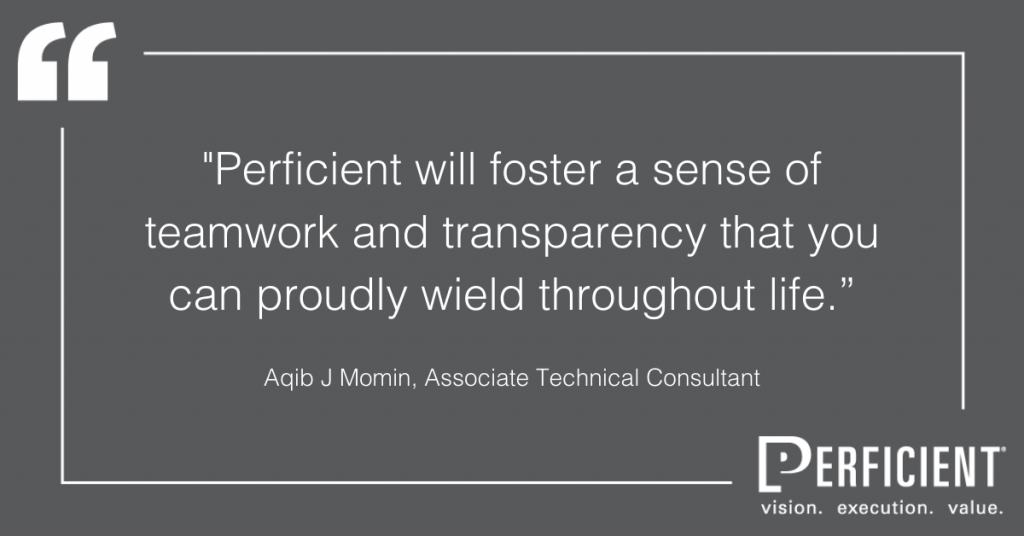The value a question holds can often be found in much more than simply the answer. Asking questions is the key to learning and building rapport, especially at Perficient.
No one is dumb who is curious. The people who don’t ask questions remain clueless throughout their lives.
— Neil deGrasse Tyson
 Asking Questions Makes You Smarter
Asking Questions Makes You Smarter
Not all questions are created the same. Below, we explain the twelve-step solution to question perfection. Before diving in, let’s examine why it’s important to ask questions.
First and foremost, you get information that builds knowledge and you get smarter. Our Perficient employees testify to that.
It’s Okay to Not Know
“Perficient is a terrific place to work and everyone I have met wants to invest in employees. Make sure to ask questions if you do not know the answer, there are tons of current employees who would be happy to answer!” — Jordan Kanter, Adobe Multi-Solution Architect
You Owe it to Yourself and Your Colleagues to Ask
“Never be afraid to ask. You do yourself and the company a disservice when you don’t take full advantage of all the nice, knowledgeable people that work here. Although I just recently started, I haven’t met anyone that discouraged me from any “dumb” (no such thing) questions. Plus, the more you ask around and learn from your coworkers, the more you will realize there is a specific place for everyone here if you just try to find it.” — Kiley Herndon, Marketing Coordinator
Be Proactive When it Comes to Asking Questions
“Ask questions, and ask questions often. People here will help you so long as you ask.” — Zach Gay, Technical Consultant
Actively Uncover Opportunities — Especially in the Beginning
“When first starting with Perficient, there is a lot of ground to cover and it can feel overwhelming at first; however, if you utilize the available resources and pay close attention to those who offer mentorship you will surely acquire a great amount of experience and knowledge. There are a lot of opportunities to learn within Perficient as long as you seize them. Definitely put in your best effort to attend onboardings and trainings, and remember that it is okay to ask questions. “ — Chris Oropeza, HR Specialist
 Asking Questions Makes People Like and Trust You
Asking Questions Makes People Like and Trust You
Asking questions shows you are listening, curious, interested, and invested. These are all traits that help craft the delicate weaving of trust.
Takeaway: The more integrated you are with your teammates, the better the experience for everyone from colleagues to clients.
People with the quickest path to success often have a certain degree of likeability. Questions can help with that.
“Human beings are basically wired to want to give help,” explains Heidi Grant, social psychologist. ”It’s one of the richest sources of self-esteem, and it has the potential to be a real win-win. Helping is rewarding for people because they like to be supportive and connect with other people.”
Takeaway: These subconscious factors are added benefits to the process of collecting valuable information. Now that is a win-win!
Asking Individually Maximizes Your Chances for Support
When you need help of any kind, it’s best to request it individually. “Another common mistake is making a request to a big group of people and hoping one of them will help you. Psychologists call this diffusion of responsibility,” continues the social psychologist. “The irony is that the more people who can help you, the less anyone feels like they have to. So it’s worth the time to send a bunch of individual emails to people that feel like individual emails.”
Takeaway: To get the highest possibility of someone extending support, request their help one-on-one.
Asking Questions Opens the Door for More. Ask Benjamin Franklin.
Meeting people when you first start a job can be exciting, and at the same time daunting, no matter what company you work for and how friendly the employees. To fasttrack your adoption, employ the Benjamin Franklin Effect.
You can read the full story here, but in short, Ben Franklin wanted to earn a particular Pennsylvania Assembly member’s advocacy, one that had snubbed him before. Faced with a dilemma, he borrowed a book from the Assemblyman. He returned it a week later with a note simply thanking the member.
By establishing a neutral rapport with a small favor, the old adage was formed: “He that has once done you a kindness will be more ready to do you another, than he whom you yourself have obliged.”
Dale Carnegie’s expands on this in his bestselling book How to Win Friends and Influence People, explains Eric Garner of ManageTrainLearn.com. ”Carnegie interprets the request for a favor as a subtle but effective form of flattery. When we ask a colleague to do us a favor, we are signaling that we consider them to have something we don’t, whether more intelligence, more knowledge, more skills, or whatever. This is another way of showing admiration and respect, something the other person may not have noticed from us before. This immediately raises their opinion of us and makes them more willing to help us again both because they enjoy the admiration and have genuinely started to like us.”
How to Ask Productive Questions in Twelve Steps
1. Do Your Homework
If Google can answer your question, you’re better off not asking it. You can save other people time and distraction by proactively scanning the internet (or other available platforms) first.
2. Choose Your Target
Start by identifying someone who can help you, someone you want to work with and look for a time you both have free.
3. Know Your Question
No matter how big or small the question, clearly understand what it is you want to know before reaching out. From “I need to know how to format this report,” to “Would you ideate this concept/tool with me to see if it could benefit our client?” there should always be a desired outcome, even if it is just to brainstorm a project. Make that clear in the request for help.
 4. Block Off Time
4. Block Off Time
Consider blocking off some calendar time with the parties involved to ensure undivided attention and the ability to make a quick plan of action should one be required.
5. To the Point
Asking only essential questions shows respect for the other’s time and demonstrates your preparation. (On the flipside, there are many benefits for coworkers to have friendly discussions not necessarily related to work — it’s a critical step to thinking outside of the box and developing authentic relationships — as long as it’s done in appropriate times and places.)
Pro Tip: Every question you ask should help you gather either facts or an opinion.
6. Develop a Hierarchy
Depending on the complexity, you might consider outlining your information goals and related questions into a hierarchy. Start with general questions and follow them up with specific ones.
7. Open-Ended
Don’t settle for Yes or No Questions. Use lead questions (why, how, what) to pull more comprehensive answers out of people.
 8. One Answer per Question
8. One Answer per Question
Focus your questions so they ask one thing at a time.
9. Short Questions Solicit Responses
To get more complete answers, craft short, clear questions.
10. Practice Makes Perfect
If you get nervous approaching people or asking big questions, it is a good idea to practice beforehand.
11. Silence is Golden
After you ask the question, be silent and wait for a response. Not only is interrupting both disruptive and disrespectful, but silence can be your friend. This becomes more important when seeking information or discussing things sensitive in nature.
12. Be ready for a follow-up
Prepare follow-up questions. Solid go-tos include “What makes you say that?” or “Why do you think that?”
 CASE STUDY: Questions Enable Teamwork and Build Transparency
CASE STUDY: Questions Enable Teamwork and Build Transparency
Are you ready to get out there and start asking smart, strategic questions? We hope so!
Here is a final thought from Aqib J Momin, Associate Technical Consultant in Atlanta about the value he found in asking his colleagues across Perficient to help him and the success (and gratitude!) he found from that.
“Be open! Do not be afraid to express your questions, difficulties, or ideas. Your fellow employees usually have the same problems and solutions that you have or will have at some point. In my few months thus far, I’ve discovered fantastic resources within the office, but only by actively speaking and seeking.
When I had difficulty with a broken code block, I was pointed towards an architect who was adept in C# and able to diagnose then correct the issue within two minutes. When I had a seemingly unsolvable question on benefits, I reached out to HR and was directed to our regional benefits coordinator (who quickly allocated a Skype call to answer my queries in detail). Moreover, I cannot count the number of times that the Atlanta management team has made themselves available for us.
One of the central tenets in the Boot Camp training program is ‘Communication’. It’s up to a new hire to be receptive to learning and applying these skills once taught. If you do, Perficient will foster a sense of teamwork and transparency that you can proudly wield throughout life.”
OPEN UP THE PERFICIENT PLAYBOOK
The Perficient Playbook is a series for anyone seeking success told straight from the stories of our employees. Perficient is known for having the best and brightest industry leaders on our teams. We treasure talent, embrace effort, and reward results. We cultivate a culture that challenges and champions great people.
At Perficient, we continually look for ways to champion and challenge our talented workforce with interesting projects for high-profile clients, encourage personal and professional growth through training and mentoring, and celebrate our people-oriented culture and the innovative ways they serve Perficient and the community.
Learn more about what it’s like to work at Perficient at our Careers page.
Go inside Life at Perficient and connect with us on LinkedIn, YouTube, Twitter, and Instagram.

